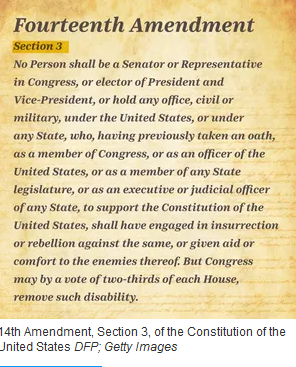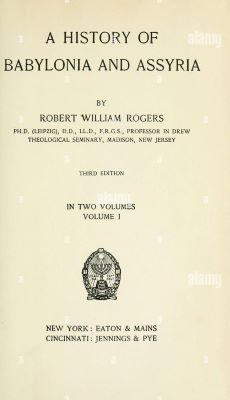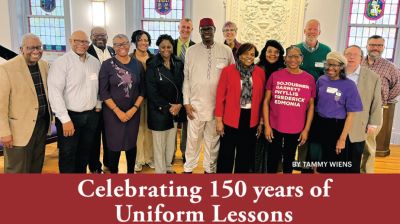
Beware the law of unintended consequences. One only has think of the developments since the Supreme Court nullified Roe v. Wade (The Law of Unintended Consequences: From Abortion to Voter Suppression, December 5, 2021). It is highly unlikely that the Supreme Court anticipated all the political ramifications which have occurred since its decision yet alone the medical conundrums it has raised as doctors wrestle with what is permissible. Certainly the wellbeing of the mother did not factor into the judicial calculations at all.
Now here we are with another momentous decision. The decision that Donald Trump would not be removed from the ballot probably came as a surprise to no one.
Obviously it was a disappointment to the roughly 30 historians who filed amici curiae on behalf of Colorado. Those briefs were reviewed in three previous blogs.
Historians Tackle the 14th Amendment Section 3 and Fail: How Come?
Historians Tackle 14th Amendment Section and Fail (2): Akhil Rees Amar and Vikram David Amar
In my previous blogs, I came to the consistent opinion applied to all three briefs. These historians were ignoring the fact that while the Second Civil War was over and had been won by the Union, the Third Civil War continues to be fought. At this point in time, the outcome remains uncertain. Skirmishes are being fought all over the place from the MAGA defeat of a Real Republican in the Ohio Senate primary, to the possible defection of a Real Republican Senator in Alaska, to the resignations of Real Republicans from the House … to say nothing of the ongoing legal battles against voter suppression and going forward.
The Supreme Court Judges are aware of the swirling chaos from the Third Civil War even if it chooses not to use that term. The closest it came in the decision about the application of the 14th Amendment Section 3 now was rendered by Justice Amy Coney Barrett. She revealed the Court’s actual motives in her separate concurrence:
In my judgment, this is not the time to amplify disagreement with stridency. The Court has settled a politically charged issue in the volatile season of a Presidential election. Particularly in this circumstance, writings on the Court should turn the national temperature down, not up.
Put simply, the Court allowed Trump to stay on the ballot in order to avoid an outcome that would raise the “national temperature.”
However the contortions to avoid wading into the current Civil War too deeply, the Court provided opportunities for Congress and/or the states should they desire to pursue them.
MICHAEL LUTTIG AND LAURENCE H. TRIBE
Some of the most prominent legal minds, not professional historians, have succumbed to the same shortfalls in judgment that the historians did. In op-ed posted to The Atlantic “A Requiem for Section 3 of the Fourteenth Amendment” (March 14, 2024), they made their displeasure clear right at the start:
The Supreme Court of the United States did a grave disservice to both the Constitution and nation in Trump v. Anderson.
In a stunning disfigurement of the Fourteenth Amendment, the Court impressed upon it an ahistorical misinterpretation that defies both its plan text and its original meaning.
Hard to mistake where they stand on the issue.
They mention other ways in which a person can be disqualified from being a candidate without any congressional or legal action such as “age, residence, natural-born citizenship.” But people have little choice about when they are born, where they are born, and to whom they are born. They have quite a lot of choice over whether to instigate, participate in, or condone an insurrection. There is something different about Amendment 14 Section 3.
After some more acrimonious words about the ruling of the Supreme Court, they concluded with the strong pronouncement that:
Our highest court dramatically and dangerously betrayed its obligation to enforce what once was the Constitution’s safety net for American democracy, The Supreme Court has now rendered that safety net a dead letter, effectively rescinding it as if it had never been enacted.
Not so fast. Let’s look at what the Supreme Court has allowed without necessarily meaning to.
STATES’ RIGHTS
The Court ruled that state courts, like Colorado, did not have the right to apply Amendment 14 Section 3 to the Office of the President, a federal position. That leaves open the question of applying it on the state level.
States may disqualify persons from holding or attempting to hold state office. But states have no power under the Constitution to enforce Section 3 with respect to federal offices, especially the presidency.
After all, despite all the attention the historians gave to Jefferson Davis, based on numbers it was all the people in the Confederate Army who were the numerous people against whom the amendment was applied … and who most often sought a pardoned under the stipulations build into the law.
In theory, therefore, states could ban people from state offices under the Amendment. This means election deniers at the state level running for state positions like Governor, Secretary of States, or legislator could be restrained from running under state law… and current office holders could be removed. I am not suggesting that Colorado or any other state would ban MAGA’s from holding state office or running for state office. I am suggesting that the Supreme Court without meaning to has provided a legal justification for so doing. While I do not foresee any state availing themselves of this power, henceforth there remains the possibility that a state could remove all insurrectionist supporters from office and/or remove them from the ballot.
CONGRESSIONAL RIGHTS
The office of the Presidency is not the only potential office under dispute. Presumably based on the Supreme Court Ruling, the House and the Senate also have the right to apply the 14th Amendment Section 3 within their own chambers. Just as each state could only decide for itself and both chambers need to decide for the presidency, each chamber could decide for itself as to the applicability within its own chamber.
This means the House and the Senate each have the right to decide if someone is in violation of the 14th Amendment Section 3. The Senate could effective immediately and for the 2024 elections establish rules of disqualification. An individual did not need to physically participate in the January 6, 2021, actions but merely to have helped plan them or to have supported not holding people responsible, calling them “hostages,” or to campaign as an election denier. Again, I do not anticipate either House taking this route. I simply state that the Court has given the two chambers the legal means to remove MAGAs from office should either one or both desire to do so.
The true test will come after the presidential election. Right now based on the polls, MAGAs have every right to expected a MAGA victory in the Electoral College, a MAGA victory in the presidential popular vote, a MAGA controlled Senate (unless too many Real Republicans go independent) and a MAGA loss in the House. For months to come, they will be told that if the MAGA candidate is not returned to the White House, then it will be because the election has been rigged. I repeat, FOR MONTHS MAGAS WILL BE TOLD THAT UNLESS THEY WIN, THE ELECTION HAS BEEN RIGGED. So if the MAGA presidential candidate prevails, then all is quiet on the Capitol steps. However if the MAGAs lose, then the Fourteenth Amendment Section 3 will be back in business.
Only time will tell.






Why do those that attempt to accuse President Trump of “insurrection” under Section 3, but ignore Section 1 which reads in part “No State shall make or enforce any law which shall …deprive any person of LIFE, liberty, or property …” when it comes to ABORTION?,
Hi Glenn,
What a interesting example of the law of unintended consequences. I guess it depends on when you define life as beginning which is a matter some contention among the states. It also shows why 535 heads meeting in open are better than 9 heads meeting in secret. In open debate, this is type of question which more likely would be asked at some point.
Pete